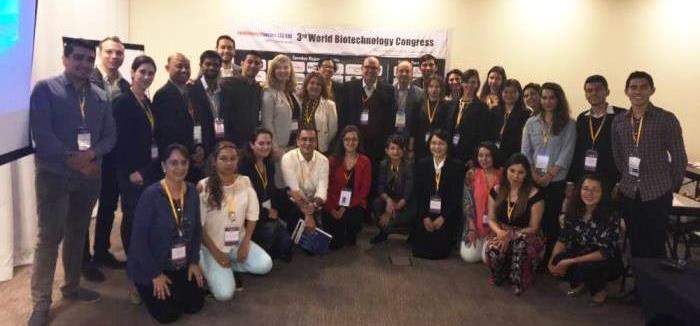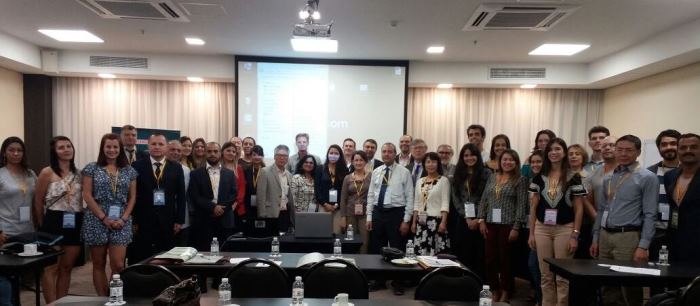Theme: Traversing the Future Challenges in Biotechnology for Leading Better Life
Mail us at : worldbiotechnology@annualamericacongress.com
World Biotechnology 2019
WOLRD BIOTECHNOLOGY CONGRESS 2018:

WORLD BIOTECHNOLOGY CONGRESS 2017:

Conference Series LLC LTD invites you to find a path to carve out a near-to-perfect platform where people like you and us can get together, stand together and discuss the possibilities in the field of Biotechnology and its related aspects.
World Biotechnology 2019 has been finalized to take place during December 06-07, 2019 in Sao Paulo, Brazil and will initiate its journey towards its aim of unifying people from different corners around the globe with the theme “Novel Insights and Innovations in Biotechnology for Leading a Better Life”.
As the premier event, we have developed a program with your interests in mind. We have not only increased the number of opportunities for you to network with colleagues from across the world but also introduced more focused sessions that will feature cutting-edge presentations, special panel discussions, and livelier interaction with industry leaders and experts.
Attend World Biotechnology 2019 to network with your peers, exchange expertise, and experiences, and arm yourself with the latest information to take your department to the next level of development.
Come and join this felicitous event in Sao Paulo, Brazil and support us in making the Conference a huge success.
Details of Biotechnology Conferences 2019 in Brazil:
Conference Series LLC Ltd is organizing Biotechnology Conferences in 2019 at Sao Paulo, Brazil. We organize Biotechnology Meetings in the fields related to Plant & Agriculture Biotechnology, Food Safety & Security, Environment Biotechnology, Animal Biotechnology, Genetic & Tissue science Engineering, Molecular Biology, NanoBiotechnology, Biofuels, Bioenergy & Bio-economy, Cell Science & Cell Biology, Pharmaceutical Biotechnology, Applied Biotechnology, Biomedical Engineering, Bioinformatics & System Biology, Gene Editing by CRISPR/CAS 9 Technology and Industrial Biotechnology.
|
Conference Name |
Place |
Date |
|
Sao Paulo, Brazil |
December 06-07, 2019 |
Target Audience for this Biotechnology Meeting:
- Biotechnology associations
- Genetic Engineering associations
- Biotechnology and Bio Pharmaceutical Industries
- Biotechnology researchers
- Business entrepreneurs
- Biological science academia’s
- Food and Nutrition researchers
- Ecologists
- Bioengineers
Crux of this World Biotechnology 2019:
World Biotechnology Congress 2019, which is going to be held in Sao Paulo, Brazil during December 06th to 07th, will be the meeting stage to address many ongoing topics in the fields related to Biotechnology, Molecular Biology, and Genetics. From Experts in these fields to students who are interested in exploring and discuss ongoing research aspects can attend this Biotechnology Conference, you can utilize this opportunity to interact with peers in your field to gain and share knowledge.
Conferenceseries LLC LTD invites the contributors across the globe to participate in the premier “4th World Biotechnology Congress” ( World Biotechnology 2019), to discuss the theme: "Novel Insights and Innovations in Biotechnology for Leading a Better Life". The conference will be held in Sao Paulo, Brazil during December 06-07, 2019 wherein prompt keynote presentations, Oral talks, Poster presentations and Exhibitions are included.
International conference of World Biotechnology 2019 is a Research-scientific knowledge bridge, that aims bring together multi-disciplinary luminaries for Thriving innovation in the Biotechnology. The scientific conferences have been carefully structured so as to share knowledge and thoughts through presentations and exhibitions. World Biotechnology 2019 event with sessions covers all aspects of biotech-driven techniques such as CRISPR, synthetically engineered T Cells for Immunotherapy, Mutagenesis techniques and computational design tools for protein design and engineering, aging and neuroscience and addresses the key issues currently affecting these researches. Attendees can look forward to hearing about the different strategies taken to improve ongoing research and decipher how to overcome technical limitations in research development. This conference is where pharm, investors and Life Science companies find partners, access innovation, find funding and brainstorm the solutions to further their business needs.
Importance and scope:
Biotechnology is multi-disciplinary subject which use of living organisms and Engineering principles to develop or make products, or "any technological application that uses biological systems, living organisms, or derivatives thereof, to make or modify products or processes for specific use" (UN Convention on Biological Diversity, Art. 2). Biotechnology has applications in industrial areas, including health care (medical), Bio pharmaceutical industries, crop production and agriculture, non food (industrial) uses of crops and other products (e.g. vegetable oil, biofuels), and environmental uses. Growing demand for food for increasing population, ever increasing vaccination demand for people with affordable cost, solving inherited genetic diseases, to decrease global temperature by using bio-fertilizers which non emitting GHGs, leading life of the people with better life, can achieved with the help of biotechnology. So scope of biotechnology is very wide and it touches the every walk of life. By considering potentiality of growing technology in down-stream and up-stream processing in biopharma, genetic engineering, Tissue and protein engineering, fermentation technology and relevant fields, the sharing of thoughts and brain storming is necessary for contemporary developments in biotechnology research.
Target Audience:
Target Audience for Biotechnology congress will be personnel from both industrial and academic fields which include; Directors/Managers, Head of Departmental, Presidents/Vice Presidents, CEO, Professors, Associate and Assistant professors, Research Scholars and students from the related fields.
Target Audience
Industry 40%
Academia 50%
Others 10%
Major Biotechnology Associations around the Globe:
· American Society for Biochemistry and Molecular Biology
· American Society of Gene Therapy
· European Federation of Biotechnology
· American Genetic Association
· Biotechnology and Biological Research Council (UK)
· European Association of Pharma Biotechnology
Track 1: Medicine & Biotechnology
From manipulation of mutant genes to enhanced resistance to disease, biotechnology has allowed advances in medicine. Biotechnology is used in the medicinal field such as Pharmacogenomics, Genetic Diagnosis and Gene Therapy. The study of pharmacogenomics can result in the development of tailor-made vaccines for people, more accurate means of determining drug dosages, improvements in drug discovery and approval, and the development of safer vaccines. Modern biotechnology can be used to manufacture drugs more easily and cheaply, as they can be produced in larger quantities from existing genetic sources. Genetic diagnosis involves the process of testing for suspected genetic defects before administering treatment through genetic testing. In gene therapy, a good gene is introduced at a random location in the genome to aid the cure of a disease that is caused by a mutated gene.
Related Conferences
; 8th World Congress and Expo on Cell & Stem Cell Research March 20-22, 2019 Orlando, Florida, USA; 3rd International Conference & Exhibition on Tissue Preservation and Biobanking August 23-24, 2019 San Francisco, California, USA; 9th International Convention on Stem Cell and Biobanking October 23-24, 2019 Osaka, Japan; 3rd International Conference on Biotechnology and Agriculture Engineering Mar 28-30, 2019, Osaka, Japan; 8th International Conference on Food Engineering and Biotechnology Apr 24-26, 2019 Kuala Lumpur, Malaysia; National Biotechnology Conference, May 1-3, 2019, San diego, USA; 7th International Conference on Bioscience, Biochemistry, Bioinformatics Jan 21-23, 2019, Bangkok, Thailand; Global Biotechnology Congress 2019, July 10-13, Boston, USA; The European Forum for Industrial Biotechnology and Bio economy Oct 19-20,2019 , Brussels, Belgium; 14th Asia Pacific Biotechnology Congress July 20-22, 2019 , Melbourne, Australia. Annual Summit on Cell Therapy September 27-28, 2019, Chicago, Illinois, USA; Annual Summit on Cell Signaling and Cancer Therapy September 27-28, 2019, Chicago, Illinois, USA
Track 2: Medical Biotechnology
Medical Biotechnology or Red Biotechnology is the use of living cells and cell materials to research and produce pharmaceutical and diagnostic products that help and prevent human diseases. Applications in pharmacology, gene therapy, stem cells, Tissue engineering. By discovering new drugs and vaccines, there have been improved and accelerated drug testing, better diagnostic capabilities, and the availability of foods which enhance nutritional values. It has applications in manufacture pharmaceuticals like enzymes, antibiotics and vaccines, and its use for molecular diagnostic. Today, the availability of “targeted therapies” for diseases and individuals should greatly improve drug safety and efficacy, and the development of predictive technologies may lead to a new era in disease prevention, especially in some of the world’s fast developing economies. This sound rationale holds great potential and promise in the field of medical biotechnology.
Related Conferences
Annual Summit on Cell Therapy September 27-28, 2019, Chicago, Illinois, USA; Annual Summit on Cell Signaling and Cancer Therapy September 27-28, 2019, Chicago, Illinois, USA; 8th World Congress and Expo on Cell & Stem Cell Research March 20-22, 2019 Orlando, Florida, USA; 3rd International Conference & Exhibition on Tissue Preservation and Biobanking August 23-24, 2019 San Francisco, California, USA; 9th International Convention on Stem Cell and Biobanking October 23-24, 2019 Osaka, Japan; 3rd International Conference on Biotechnology and Agriculture Engineering Mar 28-30, 2019, Osaka, Japan; 8th International Conference on Food Engineering and Biotechnology Apr 24-26, 2019 Kuala Lumpur, Malaysia; National Biotechnology Conference, May 1-3, 2019, San diego, USA; 7th International Conference on Bioscience, Biochemistry, Bioinformatics Jan 21-23, 2019, Bangkok, Thailand; Global Biotechnology Congress 2019, July 10-13, Boston, USA; The European Forum for Industrial Biotechnology and Bio economy Oct 19-20,2019 , Brussels, Belgium; 14th Asia Pacific Biotechnology Congress July 20-22, 2019 , Melbourne, Australia.
Track 3: Biomedical Engineering and Bio-Engineering
Biomedical engineering is the multydisplinary subject which uses engineering principles and techniques to the medical field. This field seeks to close the gap between engineering and medicine.It combines the Principles and problem solving skills of engineering with medical and biological sciences to improve healthcare diagnosis and treatment. This is evident throughout healthcare, from diagnosis and analysis to treatment, care, and recovery, and has entered the public domain though the multiplication of implantable medical devices, such as pacemakers and artificial hips, to more state of the art technologies such as stem cell engineering and the 3-D printing of biological organs. Biomedical engineering focuses on the advances that improve human health and health care at all levels. There are potentialities in industry for innovating, designing, and developing new technologies; in academia furthering research and pushing the frontiers of what is medically possible as well as implementing, testing and developing new diagnostic tools and medical equipment; and in government for establishing safety standards for medical devices.
Related Conferences
Annual Summit on Cell Therapy September 27-28, 2019, Chicago, Illinois, USA; Annual Summit on Cell Signaling and Cancer Therapy September 27-28, 2019, Chicago, Illinois, USA; 8th World Congress and Expo on Cell & Stem Cell Research March 20-22, 2019 Orlando, Florida, USA; 3rd International Conference & Exhibition on Tissue Preservation and Biobanking August 23-24, 2019 San Francisco, California, USA; 9th International Convention on Stem Cell and Biobanking October 23-24, 2019 Osaka, Japan; 3rd International Conference on Biotechnology and Agriculture Engineering Mar 28-30, 2019, Osaka, Japan; 8th International Conference on Food Engineering and Biotechnology Apr 24-26, 2019 Kuala Lumpur, Malaysia; National Biotechnology Conference, May 1-3, 2019, San diego, USA; 7th International Conference on Bioscience, Biochemistry, Bioinformatics Jan 21-23, 2019, Bangkok, Thailand; Global Biotechnology Congress 2019, July 10-13, Boston, USA; The European Forum for Industrial Biotechnology and Bio economy Oct 19-20,2019 , Brussels, Belgium; 14th Asia Pacific Biotechnology Congress July 20-22, 2019 , Melbourne, Australia.
Track 4: Pharmaceutical Biotechnology
Pharmaceutical biotechnology is a comparatively new and growing field in which the principles of biotechnology are applied to the designing and production of drugs. Pharmaceutical companies manufacture and market drugs, livestock feed supplements, vitamins, and a host of other products. Consistently, Pharmaceutical companies are one of the most profitable industries in the U.S. with sales exceeding $320 billion per year. The Biotechnology industry uses modern technologies in genetics research to develop products for human diseases, includes companies engaged in drug discovery and research, production and biologically engineered food production. Biotech opportunities largely mirror those in the pharmaceutical industry yet this industry is still in its’ infancy stage developmentally. A majority of therapeutic drugs in the current market are bioformulations, such as antibodies, nucleic acid products and vaccines. Such bioformulations are developed through several stages that include: understanding the principles involed in health and disease; the fundamental molecular mechanisms governing the function of related biomolecules; production and purification of the molecules; determining the product shelf life, stability, toxicity and immunogenicity; drug delivery systems; patenting; and clinical trials. The future of bio-pharmaceuticals belongs to protein based therapeutics. Designing stable and effective therapeutic proteins requires knowledge of protein structure and the interactions that stabilise the structure necessary for function.
Related Conferences
Annual Summit on Cell Therapy September 27-28, 2019, Chicago, Illinois, USA; Annual Summit on Cell Signaling and Cancer Therapy September 27-28, 2019, Chicago, Illinois, USA; 8th World Congress and Expo on Cell & Stem Cell Research March 20-22, 2019 Orlando, Florida, USA; 3rd International Conference & Exhibition on Tissue Preservation and Biobanking August 23-24, 2019 San Francisco, California, USA; 9th International Convention on Stem Cell and Biobanking October 23-24, 2019 Osaka, Japan; 3rd International Conference on Biotechnology and Agriculture Engineering Mar 28-30, 2019, Osaka, Japan; 8th International Conference on Food Engineering and Biotechnology Apr 24-26, 2019 Kuala Lumpur, Malaysia; National Biotechnology Conference, May 1-3, 2019, San diego, USA; 7th International Conference on Bioscience, Biochemistry, Bioinformatics Jan 21-23, 2019, Bangkok, Thailand; Global Biotechnology Congress 2019, July 10-13, Boston, USA; The European Forum for Industrial Biotechnology and Bio economy Oct 19-20,2019 , Brussels, Belgium; 14th Asia Pacific Biotechnology Congress July 20-22, 2019 , Melbourne, Australia.
Track 5: Genetic Engineering and Tissue Engineering
Genetic engineering is the manipulation of an organism's genome using biotechnology Principles. It is a set of technologies used to change the genetic makeup of cells, including the transfer of genes within and across species domains for the production of improved or novel organisms. Genetic engineering has applications in medicine, research, industry and agriculture and can be used on a wide range of plants, animals and micro organisms. Tissue engineering is the use of a integration of cells, engineering and materials principles, and suitable biochemical and physicochemical factors to improve or replace biological tissues. It involves the use of a scaffold for the formation of new viable tissue for a medical purpose. Tissue engineering cover a broad range of applications, that repair or replace portions of or whole tissues (i.e., bone, cartilage, blood vessels, bladder, skin, muscle etc.). The definition of regenerative medicine is often used same sense with tissue engineering, although those involved in regenerative medicine place more emphasis on the use of stem cells or progenitor cells to produce tissues.
Related Conferences
Annual Summit on Cell Therapy September 27-28, 2019, Chicago, Illinois, USA; Annual Summit on Cell Signaling and Cancer Therapy September 27-28, 2019, Chicago, Illinois, USA; 8th World Congress and Expo on Cell & Stem Cell Research March 20-22, 2019 Orlando, Florida, USA; 3rd International Conference & Exhibition on Tissue Preservation and Biobanking August 23-24, 2019 San Francisco, California, USA; 9th International Convention on Stem Cell and Biobanking October 23-24, 2019 Osaka, Japan; 3rd International Conference on Biotechnology and Agriculture Engineering Mar 28-30, 2019, Osaka, Japan; 8th International Conference on Food Engineering and Biotechnology Apr 24-26, 2019 Kuala Lumpur, Malaysia; National Biotechnology Conference, May 1-3, 2019, San diego, USA; 7th International Conference on Bioscience, Biochemistry, Bioinformatics Jan 21-23, 2019, Bangkok, Thailand; Global Biotechnology Congress 2019, July 10-13, Boston, USA; The European Forum for Industrial Biotechnology and Bio economy Oct 19-20,2019 , Brussels, Belgium; 14th Asia Pacific Biotechnology Congress July 20-22, 2019 , Melbourne, Australia.
Track 6 : Enzyme and Protein Engineering
Protein engineering is the synthesis proteins by manipulation of structure and process of developing useful or valuable proteins. It is a new discipline, with much research taking place into the understanding of protein folding, structure and recognition for protein design principles. It is also a product and services market, with an estimated value of $178 billion by 2019. In the future, more detailed knowledge of protein structure, folding and function, as well as advancements in modern technology, may greatly expand the potentiality of protein engineering. Eventually, even unnatural amino acids may be incorporated, owning to a new method that allows the inclusion of novel amino acids in the genetic code. Proteins have important role in physiological processes and they are involved in movement, recognition, catalysis, regulation etc. Moreover, proteins also have several therapeutically and industrial applications. Enzyme engineering is the modifying an enzyme's structure (and, thus, its function) or modifying the catalytic activity of enzymes to produce new metabolites, to allow new (catalyzed) pathways for reactions to occur, or to convert certain compounds into others (biotransformation). These products are useful as chemicals, pharmaceuticals, fuel, food industries, or agricultural additives. In the future, enzymes may be restructured to fit more appropriately into industrial processes for the production of desired metabolites.
Related Conferences
Annual Summit on Cell Therapy September 27-28, 2019, Chicago, Illinois, USA; Annual Summit on Cell Signaling and Cancer Therapy September 27-28, 2019, Chicago, Illinois, USA; 8th World Congress and Expo on Cell & Stem Cell Research March 20-22, 2019 Orlando, Florida, USA; 3rd International Conference & Exhibition on Tissue Preservation and Biobanking August 23-24, 2019 San Francisco, California, USA; 9th International Convention on Stem Cell and Biobanking October 23-24, 2019 Osaka, Japan; 3rd International Conference on Biotechnology and Agriculture Engineering Mar 28-30, 2019, Osaka, Japan; 8th International Conference on Food Engineering and Biotechnology Apr 24-26, 2019 Kuala Lumpur, Malaysia; National Biotechnology Conference, May 1-3, 2019, San diego, USA; 7th International Conference on Bioscience, Biochemistry, Bioinformatics Jan 21-23, 2019, Bangkok, Thailand; Global Biotechnology Congress 2019, July 10-13, Boston, USA; The European Forum for Industrial Biotechnology and Bio economy Oct 19-20,2019 , Brussels, Belgium; 14th Asia Pacific Biotechnology Congress July 20-22, 2019 , Melbourne, Australia.
Track 7: Nanobiotechnology
Nanobiotechnology is the multidisciplinary subject which combines engineering principles and molecular biology. Nanobiotechnology has the potentiality to create biological and biochemical materials and devices at molecular and atomic levels. It presents new class of multifunctional systems and devices for biological analysis with better sensitivity and much specificity. Nanobiotechnology subsumes the application of the tools and processes of nanotechnology to control biological systems. The nanobiotechnology includes new techniques such as 3D imaging in live cells, real-time imaging, and single molecule imaging bioanalytical microarrays and biosensors and microfluidic devices. This discipline helps to indicate the subsume of biological research with various fields of nanotechnology. Concepts that are enhanced through nanobiology comprises: nanodevices (such as biological machines), nanoparticles, and nanoscale phenomena that available within the discipline of nanotechnology. This technical approach to biology allows scientists to envisage and create systems that can be used for biological research. Biologically inspired nanotechnology uses biological systems as the encourisation for technologies not yet created. However, as with nanotechnology and biotechnology, bionanotechnology does have many potential ethical issues associated with it.
Related Conferences
Annual Summit on Cell Therapy September 27-28, 2019, Chicago, Illinois, USA; Annual Summit on Cell Signaling and Cancer Therapy September 27-28, 2019, Chicago, Illinois, USA; 8th World Congress and Expo on Cell & Stem Cell Research March 20-22, 2019 Orlando, Florida, USA; 3rd International Conference & Exhibition on Tissue Preservation and Biobanking August 23-24, 2019 San Francisco, California, USA; 9th International Convention on Stem Cell and Biobanking October 23-24, 2019 Osaka, Japan; 3rd International Conference on Biotechnology and Agriculture Engineering Mar 28-30, 2019, Osaka, Japan; 8th International Conference on Food Engineering and Biotechnology Apr 24-26, 2019 Kuala Lumpur, Malaysia; National Biotechnology Conference, May 1-3, 2019, San diego, USA; 7th International Conference on Bioscience, Biochemistry, Bioinformatics Jan 21-23, 2019, Bangkok, Thailand; Global Biotechnology Congress 2019, July 10-13, Boston, USA; The European Forum for Industrial Biotechnology and Bio economy Oct 19-20,2019 , Brussels, Belgium; 14th Asia Pacific Biotechnology Congress July 20-22, 2019 , Melbourne, Australia.
Track 8: Plant, Agriculture and Environment Biotechnology
Agricultural biotechnology, also known as agritech, is an area of agricultural science involving the use of scientific tools and techniques, including genetic engineering, molecular markers, molecular diagnostics, vaccines, and tissue culture, to modify living organisms: plants, animals, and microorganisms. Biotechnology is used in many ways in agriculture. Agricultural biotechnology companies work to supply farmers with tools to increase the yield of plant and animal products, while lowering the costs of production. Agricultural biotechnology can also include production of plants such as orchids for ornamental purposes and plants that can be used for fuel production (biofuels). To accomplish these goals, biotechnologists develop products to protect animals and crops from disease and help farmers identify the best animals and seeds to use in selective breeding programs. Environmental biotechnology is a system of scientific and engineering knowledge related to the use of microorganisms and their products in the prevention of environmental pollution through biotreatment of solid, liquid, and gaseous wastes, bioremediation of polluted environments, and biomonitoring of environment and treatment processes. The International Society for Environmental Biotechnology defines environmental biotechnology as "the development, use and regulation of biological systems for remediation of contaminated environments (land, air, water), and for environment-friendly processes (green manufacturing technologies and sustainable development)". Science through the IAASTD has called for the advancement of small-scale agro-ecological farming systems and technology in order to achieve food security, climate change mitigation, climate change adaptation and the realisation of the Millennium Development Goals. Environmental biotechnology has been shown to play a significant role in agroecology in the form of zero waste agriculture and most significantly through the operation of over 15 million biogas digesters worldwide.
Related Conferences
Annual Summit on Cell Therapy September 27-28, 2019, Chicago, Illinois, USA; Annual Summit on Cell Signaling and Cancer Therapy September 27-28, 2019, Chicago, Illinois, USA; 8th World Congress and Expo on Cell & Stem Cell Research March 20-22, 2019 Orlando, Florida, USA; 3rd International Conference & Exhibition on Tissue Preservation and Biobanking August 23-24, 2019 San Francisco, California, USA; 9th International Convention on Stem Cell and Biobanking October 23-24, 2019 Osaka, Japan; 3rd International Conference on Biotechnology and Agriculture Engineering Mar 28-30, 2019, Osaka, Japan; 8th International Conference on Food Engineering and Biotechnology Apr 24-26, 2019 Kuala Lumpur, Malaysia; National Biotechnology Conference, May 1-3, 2019, San diego, USA; 7th International Conference on Bioscience, Biochemistry, Bioinformatics Jan 21-23, 2019, Bangkok, Thailand; Global Biotechnology Congress 2019, July 10-13, Boston, USA; The European Forum for Industrial Biotechnology and Bio economy Oct 19-20,2019 , Brussels, Belgium; 14th Asia Pacific Biotechnology Congress July 20-22, 2019 , Melbourne, Australia.
Track 9: Marine, Aquatic and Ocean Biotechnology
The ocean has the oldest, most diverse, most numerous and least studied organisms on earth. It covers almost three fourths of our planet and has the potential to feed the world and supply cures for many diseases. Studying sea plants and animals is a challenge that is becoming easier due to advanced technologies such as deep-sea submersibles, sonar, lasers, videos, and satellites. Biotechnology contributes to current or potential uses of marine products in the areas of: Aquaculture, Conservation of marine ecosystems Therapeutics/medicines, Aquatic animal health and seafood safety, Biomedical research Algae cultivation. Marine Biotechnology is a relatively new field of study, having emerged in the past few years. It began in 1998 when scientists from the Scripps Institution of Oceanography and various departments of the University of California, San Diego, came together and formed the Center for Marine Biotechnology and Biomedicine. The Specialty Marine Biotechnology is intended to host scientific contributions in marine science that are based on the enormous biodiversity of marine ecosystems and the genetic uniqueness of marine organisms to develop useful products and applications. Marine Biotechnology is the study of how the various organisms and actions of the ocean can be used to provide services and products to us. Marine Biotechnology is the use of living marine resources at (eco)system, concept, organism or molecular level to provide beneficial solutions for the society. Scientists in this field of Marine Biotechnology are studying the various enzymes and proteins of marine life in hopes of solving many problems that plague the area of Agriculture and Industry today. These problems include trying to find anti-corrosive coatings and "self-cleaning" surfaces for industrial use.
Related Conferences
Annual Summit on Cell Therapy September 27-28, 2019, Chicago, Illinois, USA; Annual Summit on Cell Signaling and Cancer Therapy September 27-28, 2019, Chicago, Illinois, USA; 8th World Congress and Expo on Cell & Stem Cell Research March 20-22, 2019 Orlando, Florida, USA; 3rd International Conference & Exhibition on Tissue Preservation and Biobanking August 23-24, 2019 San Francisco, California, USA; 9th International Convention on Stem Cell and Biobanking October 23-24, 2019 Osaka, Japan; 3rd International Conference on Biotechnology and Agriculture Engineering Mar 28-30, 2019, Osaka, Japan; 8th International Conference on Food Engineering and Biotechnology Apr 24-26, 2019 Kuala Lumpur, Malaysia; National Biotechnology Conference, May 1-3, 2019, San diego, USA; 7th International Conference on Bioscience, Biochemistry, Bioinformatics Jan 21-23, 2019, Bangkok, Thailand; Global Biotechnology Congress 2019, July 10-13, Boston, USA; The European Forum for Industrial Biotechnology and Bio economy Oct 19-20,2019 , Brussels, Belgium; 14th Asia Pacific Biotechnology Congress July 20-22, 2019 , Melbourne, Australia.
Track 10: Food & Feed Biotechnology
Food biotechnology is the application of technology to modify genes of animals, plants, and microorganisms to create new species which have desired production, marketing, or nutrition related properties. Genetically engineered (GE) or genetically modified (GM) foods, they are a source of an unresolved controversy over the uncertainty of their long-term effects on humans and food chains. Food biotechnology is and will continue to be an important area in science as the world’s human population continues to increase and the world’s agricultural lands continue to decrease. Food biotechnology employs the tools of modern genetics to enhance beneficial traits of plants, animals, and microorganisms for food production. It involves adding or extracting select genes to achieve desired traits. Food biotechnology offers the potential to further improve our nation’s health and the health of developing nations. The work currently being done with “golden rice” and the potential it has to help combat hunger and malnutrition related diseases. Purchase fruits and vegetables with increased antioxidant content that may reduce risk for cancer. Plant-made pharmaceuticals are the latest evolution within the realm of biotechnology. As the name suggests, this process uses genetics to enable plants to produce protein-based medicines to treat diseases and save lives. These proteins are extracted from the plant and developed into pharmaceuticals. Edible vaccines are among the most innovative approaches for administering new vaccines. For example, researchers have investigated putting a vaccine into bananas that would protect against food borne pathogens.
Related Conferences
Annual Summit on Cell Therapy September 27-28, 2019, Chicago, Illinois, USA; Annual Summit on Cell Signaling and Cancer Therapy September 27-28, 2019, Chicago, Illinois, USA; 8th World Congress and Expo on Cell & Stem Cell Research March 20-22, 2019 Orlando, Florida, USA; 3rd International Conference & Exhibition on Tissue Preservation and Biobanking August 23-24, 2019 San Francisco, California, USA; 9th International Convention on Stem Cell and Biobanking October 23-24, 2019 Osaka, Japan; 3rd International Conference on Biotechnology and Agriculture Engineering Mar 28-30, 2019, Osaka, Japan; 8th International Conference on Food Engineering and Biotechnology Apr 24-26, 2019 Kuala Lumpur, Malaysia; National Biotechnology Conference, May 1-3, 2019, San diego, USA; 7th International Conference on Bioscience, Biochemistry, Bioinformatics Jan 21-23, 2019, Bangkok, Thailand; Global Biotechnology Congress 2019, July 10-13, Boston, USA; The European Forum for Industrial Biotechnology and Bio economy Oct 19-20,2019 , Brussels, Belgium; 14th Asia Pacific Biotechnology Congress July 20-22, 2019 , Melbourne, Australia.
Track 11: Animal Biotechnology
Animal biotechnology is a branch of biotechnology in which molecular biology techniques are used to genetically engineer (i.e. modify the genome of) animals in order to improve their suitability for pharmaceutical, agricultural or industrial applications. Animal biotechnology has been used to produce genetically modified animals that synthesize therapeutic proteins, have improved growth rates or are resistant to disease. Animal health and efficiency in generating animal based products with a target to increase quantity as well as quality of such products is the ultimate motive behind scientific research. Animal biotechnology is the use of science and engineering to modify living organisms. The goal is to make products, to improve animals and to develop microorganisms for specific agricultural uses. Examples of animal biotechnology include creating transgenic animals (animals with one or more genes introduced by human intervention), using gene knock out technology to make animals with a specific inactivated gene and producing nearly identical animals by somatic cell nuclear transfer (or cloning). Animal biotechnology in use today is based on the science of genetic engineering. Under the umbrella of genetic engineering exist other technologies, such as transgenic and cloning, that also are used in animal biotechnology. The potential benefits of animal biotechnology are numerous and include enhanced nutritional content of food for human consumption; a more abundant, cheaper and varied food supply; agricultural land-use savings; a decrease in the number of animals needed for the food supply; improved health of animals and humans; development of new, low-cost disease treatments for humans; and increased understanding of human disease.
Related Conferences
Annual Summit on Cell Therapy September 27-28, 2019, Chicago, Illinois, USA; Annual Summit on Cell Signaling and Cancer Therapy September 27-28, 2019, Chicago, Illinois, USA; 8th World Congress and Expo on Cell & Stem Cell Research March 20-22, 2019 Orlando, Florida, USA; 3rd International Conference & Exhibition on Tissue Preservation and Biobanking August 23-24, 2019 San Francisco, California, USA; 9th International Convention on Stem Cell and Biobanking October 23-24, 2019 Osaka, Japan; 3rd International Conference on Biotechnology and Agriculture Engineering Mar 28-30, 2019, Osaka, Japan; 8th International Conference on Food Engineering and Biotechnology Apr 24-26, 2019 Kuala Lumpur, Malaysia; National Biotechnology Conference, May 1-3, 2019, San diego, USA; 7th International Conference on Bioscience, Biochemistry, Bioinformatics Jan 21-23, 2019, Bangkok, Thailand; Global Biotechnology Congress 2019, July 10-13, Boston, USA; The European Forum for Industrial Biotechnology and Bio economy Oct 19-20,2019 , Brussels, Belgium; 14th Asia Pacific Biotechnology Congress July 20-22, 2019 , Melbourne, Australia.
Track 12: Bioinformatics and Biomedicine Engineering
Bioinformatics is an interdisciplinary field that develops methods and software tools for understanding biological data. As an interdisciplinary field of science, bioinformatics combines computer science, statistics, mathematics, and engineering to analyze and interpret biological data. Bioinformatics has been used for in silico analyses of biological queries using mathematical and statistical techniques. "All aspects of gathering, storing, handling, analyzing, interpreting and spreading vast amounts of biological information in databases”. The information involved includes gene sequences, biological activity/function, pharmacological activity, biological structure, molecular structure, protein-protein interactions, and gene expression. Bioinformatics uses powerful computers and statistical techniques to accomplish research objectives, for example, to discover a new pharmaceutical or herbicide." Deals with the computational management and analysis of biological information: genes, genomes, proteins, cells, ecological systems, medical information, robots, artificial intelligence. Areas of current and future development of bioinformatics are Molecular biology and genetics, Phylogenetic and evolutionary sciences, different aspects of biotechnology including pharmaceutical and microbiological industries, Medicine, Agriculture, Eco-management.
Related Conferences
Annual Summit on Cell Therapy September 27-28, 2019, Chicago, Illinois, USA; Annual Summit on Cell Signaling and Cancer Therapy September 27-28, 2019, Chicago, Illinois, USA; 8th World Congress and Expo on Cell & Stem Cell Research March 20-22, 2019 Orlando, Florida, USA; 3rd International Conference & Exhibition on Tissue Preservation and Biobanking August 23-24, 2019 San Francisco, California, USA; 9th International Convention on Stem Cell and Biobanking October 23-24, 2019 Osaka, Japan; 3rd International Conference on Biotechnology and Agriculture Engineering Mar 28-30, 2019, Osaka, Japan; 8th International Conference on Food Engineering and Biotechnology Apr 24-26, 2019 Kuala Lumpur, Malaysia; National Biotechnology Conference, May 1-3, 2019, San diego, USA; 7th International Conference on Bioscience, Biochemistry, Bioinformatics Jan 21-23, 2019, Bangkok, Thailand; Global Biotechnology Congress 2019, July 10-13, Boston, USA; The European Forum for Industrial Biotechnology and Bio economy Oct 19-20,2019 , Brussels, Belgium; 14th Asia Pacific Biotechnology Congress July 20-22, 2019 , Melbourne, Australia.
Track 13: Industrial and Microbial Biotechnology
Industrial biotechnology is a set of practices that use living cells (such as bacteria, yeast, algae) or component of cells like enzymes, to generate industrial products and processes. Industrial biotechnology can be used to: Create new products, such as plant-based biodegradable plastics; Replace petroleum-based feedstocks by processing biomass in biorefineries to produce electricity, transport fuels or chemicals; Modify and develop new industrial processes, such as by using enzymes to reduce the number of harsh chemicals used the textile or pulp and paper industries; Reduce the environmental impact of manufacturing; for example by treating industrial wastewater onsite using biological mediums such as microbes; Industrial biotechnology is one of the most promising new approaches to pollution prevention, resource conservation, and cost reduction. It is often referred to as the third wave in biotechnology. If developed to its full potential, industrial biotechnology may have a larger impact on the world than health care and agricultural biotechnology. It offers businesses a way to reduce costs and create new markets while protecting the environment. Also, since many of its products do not require the lengthy review times that drug products must undergo, it's a quicker, easier pathway to the market. Today, new industrial processes can be taken from lab study to commercial application in two to five years, compared to up to a decade for drugs.
Related Conferences
Annual Summit on Cell Therapy September 27-28, 2019, Chicago, Illinois, USA; Annual Summit on Cell Signaling and Cancer Therapy September 27-28, 2019, Chicago, Illinois, USA; 8th World Congress and Expo on Cell & Stem Cell Research March 20-22, 2019 Orlando, Florida, USA; 3rd International Conference & Exhibition on Tissue Preservation and Biobanking August 23-24, 2019 San Francisco, California, USA; 9th International Convention on Stem Cell and Biobanking October 23-24, 2019 Osaka, Japan; 3rd International Conference on Biotechnology and Agriculture Engineering Mar 28-30, 2019, Osaka, Japan; 8th International Conference on Food Engineering and Biotechnology Apr 24-26, 2019 Kuala Lumpur, Malaysia; National Biotechnology Conference, May 1-3, 2019, San diego, USA; 7th International Conference on Bioscience, Biochemistry, Bioinformatics Jan 21-23, 2019, Bangkok, Thailand; Global Biotechnology Congress 2019, July 10-13, Boston, USA; The European Forum for Industrial Biotechnology and Bio economy Oct 19-20,2019 , Brussels, Belgium; 14th Asia Pacific Biotechnology Congress July 20-22, 2019 , Melbourne, Australia.
Track 14: Applied Biotechnology
The applied biotechnology major deals with the scientific background and laboratory experience necessary for the biotechnology and pharmaceutical industries, or for advanced study in the applications of biotechnology and molecular biology for the use and improvement of plants, animals, and micro-organisms. In addition, it can be to prepare for professional programs in medicine. Multi-discipline science of interest in chemistry, biotechnology, microbiology. This interdisciplinary major brings together areas of study such as animals, food science, forestry, entomology, and plants to improve the knowledge and skills necessary to use biotechnology for the improvement of plants, animals, and microorganisms. Gaining theoretical as well as hands-on knowledge in the areas of molecular biology, structural biology and biotechnology furthermore, studies in the areas of protein engineering, synthetic biology and molecular biotechnology for renewable energy. Thanks to the courses in project management, marketing, and entrepreneurship, one will also gain insight into business management and learn how projects are planned and carried out in the biotechnology industry.
Related Conferences
Annual Summit on Cell Therapy September 27-28, 2019, Chicago, Illinois, USA; Annual Summit on Cell Signaling and Cancer Therapy September 27-28, 2019, Chicago, Illinois, USA; 8th World Congress and Expo on Cell & Stem Cell Research March 20-22, 2019 Orlando, Florida, USA; 3rd International Conference & Exhibition on Tissue Preservation and Biobanking August 23-24, 2019 San Francisco, California, USA; 9th International Convention on Stem Cell and Biobanking October 23-24, 2019 Osaka, Japan; 3rd International Conference on Biotechnology and Agriculture Engineering Mar 28-30, 2019, Osaka, Japan; 8th International Conference on Food Engineering and Biotechnology Apr 24-26, 2019 Kuala Lumpur, Malaysia; National Biotechnology Conference, May 1-3, 2019, San diego, USA; 7th International Conference on Bioscience, Biochemistry, Bioinformatics Jan 21-23, 2019, Bangkok, Thailand; Global Biotechnology Congress 2019, July 10-13, Boston, USA; The European Forum for Industrial Biotechnology and Bio economy Oct 19-20,2019 , Brussels, Belgium; 14th Asia Pacific Biotechnology Congress July 20-22, 2019 , Melbourne, Australia.
Track 15 Bio-Safety and Bioethics
Biosafety as currently discussed in the International “Convention on Biological Diversity” (CBD) and designed to create internationally binding protocols on biosafety. The application of biotechnology to food and agriculture can bring not only potential risks and benefits as any technology can but also concerns about the human dimensions coupled with biotechnology. These include both positive and negative impacts on stakeholders, social institutions, economy, and communities. Different areas associated with biosafety include: (i) Agriculture and food system issues (ii) Market and consumer issues (iii) Institutional issues, business issues and (iv) Social issues. Biosafety is the prevention of large-scale loss of biological integrity, focusing both on ecology and human health. These prevention mechanisms include conduction of regular reviews of the biosafety in laboratory settings, as well as strict guidelines to follow. The international Cartagena Protocol on Biosafety deals primarily with the agricultural definition but many advocacy groups seek to expand it to include post-genetic threats: new molecules, artificial life forms, and even robots which may compete directly in the natural food chain. ‘Biosafety’ means the need to protect human and animal health and the environment from the possible adverse effects of the products of modern biotechnology. Bioethics is the study of the typically controversial ethical issues emerging from new situations and possibilities brought about by advances in biology and medicine. It is also moral discernment as it relates to medical policy and practice. Bioethicists are concerned with the ethical questions that arise in the relationships among life sciences, biotechnology, medicine, politics, law, and philosophy. The scope of bioethics can expand with biotechnology, including cloning, gene therapy, life extension, human genetic engineering, astroethics and life in space, and manipulation of basic biology through altered DNA, XNA and proteins. These developments will affect future evolution, and may require new principles that address life at its core, such as biotic ethics that values life itself at its basic biological processes and structures, and seeks their propagation.
Related Conferences
Annual Summit on Cell Therapy September 27-28, 2019, Chicago, Illinois, USA; Annual Summit on Cell Signaling and Cancer Therapy September 27-28, 2019, Chicago, Illinois, USA; 8th World Congress and Expo on Cell & Stem Cell Research March 20-22, 2019 Orlando, Florida, USA; 3rd International Conference & Exhibition on Tissue Preservation and Biobanking August 23-24, 2019 San Francisco, California, USA; 9th International Convention on Stem Cell and Biobanking October 23-24, 2019 Osaka, Japan; 3rd International Conference on Biotechnology and Agriculture Engineering Mar 28-30, 2019, Osaka, Japan; 8th International Conference on Food Engineering and Biotechnology Apr 24-26, 2019 Kuala Lumpur, Malaysia; National Biotechnology Conference, May 1-3, 2019, San diego, USA; 7th International Conference on Bioscience, Biochemistry, Bioinformatics Jan 21-23, 2019, Bangkok, Thailand; Global Biotechnology Congress 2019, July 10-13, Boston, USA; The European Forum for Industrial Biotechnology and Bio economy Oct 19-20,2019 , Brussels, Belgium; 14th Asia Pacific Biotechnology Congress July 20-22, 2019 , Melbourne, Australia.
Track 16 Business Development
Business Development referred to as the activity of pursuing strategic opportunities for a particular business or organization, for example by cultivating partnerships or other commercial relationships or identifying new markets for its products or services. Business development activities extend across different departments, including sales, marketing, project management, product management, and vendor management. Networking, negotiations, partnerships, and cost-savings efforts are also involved. All these different departments and activities are driven by and aligned to the business development goals.
In the simplest terms, business development can be summarized as the ideas, initiatives and activities aimed towards making business better. This includes increasing revenues, growth in terms of business expansion, and increasing profitability by building strategic partnerships and making strategic business decisions. Business development activities extend across different departments, including sales, marketing, project management, product management, and vendor management. Networking, negotiations, partnerships, and cost-savings efforts are also involved. All these different departments and activities are driven by and aligned to the business development goals. Since business development involves high-level decision making, the business developer should remain informed about the current state of the business in terms of SWOT analysis (Strengths, Weaknesses, Opportunities, and Threats). The current state of overall industry sector and growth projections, Competitor developments, Primary sources of sales/revenues of current business and dependencies, the customer profile, New and unexplored market opportunities, New domains/products/sectors eligible for business expansion, which may complement the existing business, the long-term view, especially with regards to the initiatives being proposed, the cost areas, and the possible options of cost-savings.
Related Conferences
Annual Summit on Cell Therapy September 27-28, 2019, Chicago, Illinois, USA; Annual Summit on Cell Signaling and Cancer Therapy September 27-28, 2019, Chicago, Illinois, USA; 8th World Congress and Expo on Cell & Stem Cell Research March 20-22, 2019 Orlando, Florida, USA; 3rd International Conference & Exhibition on Tissue Preservation and Biobanking August 23-24, 2019 San Francisco, California, USA; 9th International Convention on Stem Cell and Biobanking October 23-24, 2019 Osaka, Japan; 3rd International Conference on Biotechnology and Agriculture Engineering Mar 28-30, 2019, Osaka, Japan; 8th International Conference on Food Engineering and Biotechnology Apr 24-26, 2019 Kuala Lumpur, Malaysia; National Biotechnology Conference, May 1-3, 2019, San diego, USA; 7th International Conference on Bioscience, Biochemistry, Bioinformatics Jan 21-23, 2019, Bangkok, Thailand; Global Biotechnology Congress 2019, July 10-13, Boston, USA; The European Forum for Industrial Biotechnology and Bio economy Oct 19-20,2019 , Brussels, Belgium; 14th Asia Pacific Biotechnology Congress July 20-22, 2019 , Melbourne, Australia.
The biotechnology market in Brazil has seen enormous activity this year in both the areas of industrial biotechnology and healthcare. In a recent webinar that discussed the latest results of the annual Scientific American Worldview report, panelists were especially excited by the partnering opportunities in Brazil. Mike May, Editorial Director, Scientific American Worldview, commented, “Brazil is, as a country, like a master of partnering. They partner in the country between industry and government. They partner outside the country with industry and industry in other places. They have huge networks of partnering. They’re bringing industries in from other countries to help them with things where maybe they don’t have the technology So you know, it’s like they’re finding creative ways to deal with some of the challenges they have that, say, the United States doesn’t have.”
Industry Insights
Brazil is well known for its research and investment in biotechnology, particularly in regards to cellulosic sugars and agribusiness. Several companies including Amyris, BP, Dow Chemical, DuPont, and Novozymes came together to launch of the Brazilian Industrial Biotech Association (ABBI) to promote dialogue with stakeholders, policy makers, and the public about advancing industrial biotechnology in Brazil. The trade group aims to improve current patent laws in light of new biotechnology advancements, support investments in R&D, laboratory infrastructure, and capacity and training for skilled and technical labor.
Application Insights
Health associated applications accounted for the largest share as a result of the higher use of associated products in healthcare industry. Growing prevalence of chronic diseases heightening the demand for new drug development is one of the key factors accounting for the aforementioned conclusion. Moreover, growing demand for personalized medicine and biosimilars is also expected to drive segment growth during the forecast period. Bioinformatics is expected to witness the fastest growth in the coming years as a consequence of substantial developments in this field. Substantial developments include algorithm designing for efficient storage and management of genomic and proteomic data generated through the studies carried out on plant, animal or human genomes.
Regional Insights
North America dominated the overall market in terms of revenue in 2016 at 44.15%. Presence of high R&D investments pertaining to new drug discovery and development are some factors attributing to its large share. The U.S. spends more per capita on healthcare than other countries and has a high growth rate amongst other countries. According to the estimates published by OECD Health Statistics in 2014, it has been estimated that in 2012, U.S. spent nearly 16.9% of its GDP towards healthcare expenditure, which is the highest. The aforementioned fact supports the estimated share of biotechnology market.Asia Pacific on the other hand, is expected to gain market share during the forecast period owing to the presence of patient awareness, rapidly improving healthcare infrastructure and rising healthcare expenditure levels in the emerging markets.
Competitive Insights
The industry is fragmented in nature. This market encompasses several small and emerging players along with well-established major players. Some key players in the market are Johnson & Johnson Services, Inc., F. Hoffmann-La Roche Ltd, Pfizer, Merck & Co., and Sanofi. Large firms are targeting small firms with an operating strategy of acquisition in order to sustain position in the market. For instance, in July 2017, Sanofi announced to acquire Protein Sciences, a U.S. based company which deals with the R&D of vaccines, in the third quarter of this year. This acquisition by the company aimed at an addition of recombinant based influenza vaccine to its product portfolio.
Major Biotechnology Associations around the Globe
· Brazilian Industrial Biotech Association
· American Society for Biochemistry and Molecular Biology
· American Society of Gene Therapy
· American Genetic Association
· EAPB European Association of Pharma Biotechnology
· EBE European Biopharmaceutical Enterprises
· EFPIA European Federation of Pharmaceutical Industries and Associations
· Europa Bio
· JBA Japan Bio industry Association
· YEBN Young European Biotech Network
· EUCROF European CRO Federation
List of Universities related to Biotechnology
· Stanford University, USA
· University of Illinois at Urbana Champaign
· Harvard University
· University of California San Diageo
· University of Wisconsin, Madison
· Institute Federal da Bahia (IFBA), Brazil
· Universidade Católica do Salvador (UCSAL) , Brazil
· Universidade Estadual de Feira de Santana (UEFS), Brazil
· Universidade Estadual da Bahia (UNEB), Brazil
· Universidade Federal da Bahia (UFBA), Brazil
· Universidade Federal do Oeste da Bahia (UFESBA), Brazil
Major Biotechnology Companies
· Johnson & Johnson, USA
· Pfizer, Sao Paulo, Brazil
· Novartis, Switzerland
· Merck & Co United States
· Amgen USA
· Sanofi France
· AbbVie United States
· Bristol-Myers Squibb United States
· GlaxoSmithKline United Kingdom
· Bayer Germany
· Allergan Ireland
· Biogen United States
World Biotechnology 2018
Thanks to all of our Key Note Speakers, Organizing Committee members, honorable guests, wonderful speakers, conference attendees, Delegates and Media partners.
We Thank our Key Note Speakers Especially:
Olga Potapova, Cureline Inc, USA.
Suresh K Alahari, LSUHSC School of Medicine, USA.
Anuj Kumar Chandel, University of Sao Paulo, Brazil
Sonia Marli Zingaretti, Ribeirao Preto University, Brazil
For their Extreme Support for making the Event a Grand Success and for their valuable suggestions to make the Conference Better.
Our Special Thanks to Liliana Rubio, Sanitized AG, Brazil for being as the Moderator for this Event. We extend our gratitude towards Anuj Kumar Chandel, University of Sao Paulo, Brazil for being as the Poster Judge and YRF Judge.
it's time to Congragulate Bruna S Fernandes, University of Campinas, Brazil for her best poster for the Event and winning the Best Poster Award.
World Biotechnology congress 2018 Conference was the best!
3rd World Biotechnology Congress hosted by the Conference Series LLC LTD was held during December 03-04, 2018 at Hotel Novotel Sao Paulo Center Norte, Av. Zaki Narchi, Sao Paulo, Brazil with the theme “Profound Innovations and Futuristic Challenges in Biotechnology for Making Better Life “. Active participation was received from the scientists, engineers, researchers, students and leaders from the fields of Agricultural, Plant Biotechnology, Food Processing Safety and Processing, Pharmaceutical Biotechnology, Biomedical Engineering, Nano Biotechnology, Recycled Fuels, Biotechnology Industries in the Market who made this event successful.
The meeting was carried out through various sessions, in which the discussions were held on the following major scientific tracks:
Agricultural Biotechnology | Plant Biotechnology
Food Processing Safety and Processing
Pharmaceutical Biotechnology | Biomedical Engineering
Nano Biotechnology | Recycled Fuels
Biotechnology Industries in the Market | Biosafety and Bioethics
Industrial Biotechnology | Bioprocess Engineering
The conference was initiated with a series of lectures delivered by both Honorable Guests and members of the Keynote forum. The list included:
- Olga Potapova, Cureline Inc, USA
- Suresh K Alahari, LSUHSC School of Medicine, USA
- Henrique Baudel, Samerica Biomass Technologies, Brazil
- Sobri Hussein, Malaysian Nuclear Agency, Malaysia
- Jose Linares, Polytechnic University of Valencia, Spain
- Kimiko Yabe, Fukui University of Technology, Japan
- Guluzar Atli, Girona University, Spain
- Helio Gomes da Silva, University of Taubate, Brazil
- Alexandra C H F Sawaya, University of Campinas, Brazil
- Maria Teresa Clerici, University of Campinas, Brazil
- Glaucia maria Pastore, University of Campinas, Brazil
- Valéria Macedo Cardoso, Federal University of Minas Gerais, Brazil
- Nuretin Heybeli, Trakya University, Turkey
- Jorge Luis Betancurt Bermúdez, National University of Colombia, Columbia
- Eduardo Morales, University of la Frontera, Chile
- Rayssa Garcia, EMBRAPA, Brazil
Conference Series LLC LTD offers its heartfelt appreciation to all the speakers who have attended and obliged to the Organizing Committee Members, adepts of field, various outside experts, company representatives and other eminent personalities who supported the conference by facilitating the discussion forums. Conference Series LLC LTD also took privilege to felicitate the Organizing Committee Members who supported this event.
With the success of World Biotechnology Congress 2018, Conference Series LLC LTD is proud to announce the “4th World Biotechnology Congress” to be held during December 06-07, 2019 at Sao Paulo, Brazil.
For more information please visit: https://world.biotechnologycongress.com/
Conference Highlights
- Medicine & Biotechnology
- Medical Biotechnology
- Biomedical Engineering and Bio-Engineering
- Pharmaceutical Biotechnology
- Genetic Engineering and Tissue Engineering
- Enzyme and Protein Engineering
- Nanobiotechnology
- Plant, Agriculture and Environment Biotechnology
- Marine, Aquatic and Ocean Biotechnology
- Food & Feed Biotechnology
- Animal Biotechnology
- Bioinformatics and Biomedicine Engineering
- Industrial and Microbial Biotechnology
- Applied Biotechnology
- Bio-Safety and Bioethics
- Business Development
- Biomass and Bioenergy
- Global scenario of Bio economy
- Biomaterials
- Biotechnology Industries in the Market
To share your views and research, please click here to register for the Conference.
To Collaborate Scientific Professionals around the World
| Conference Date | December 06-07, 2019 | ||
| Sponsors & Exhibitors |
|
||
| Speaker Opportunity Closed | |||
| Poster Opportunity Closed | Click Here to View | ||
Useful Links
Special Issues
All accepted abstracts will be published in respective Our International Journals.
Abstracts will be provided with Digital Object Identifier by















